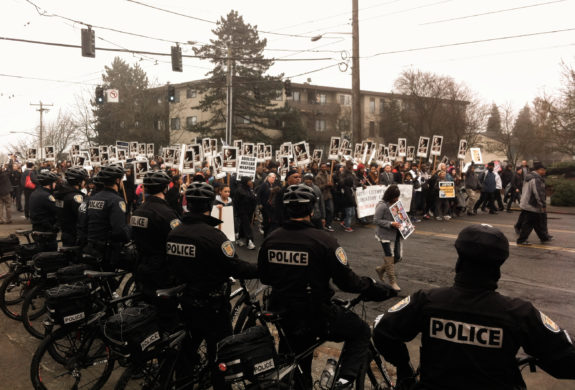
In our car-dominated American society, using a bicycle as transportation is a very positive thing to do both on a society-wide level and especially on a personal level. Obviously, as someone who rides a bike as my primary mode of transportation and writes a daily bike blog, I love bikes and view them as great and wonderful things.
But bikes are just tools, and they hold no inherent virtues or morals. They are most often used by people getting around in a healthy, fun and emission-free way. But as Seattle Police have demonstrated, bikes can also be used for violence. While bike patrols at one point were using bikes more as a way to cover more ground more quickly and nimbly than an officer on foot or in a car, the bike has increasingly become a military-style tactical weapon officers use along with body armor, pepper spray and other crowd-suppression tools used to combat protests. Crosscut and Type Investigations published a story about SPD’s use of bikes that looked into these more violent uses (they also made a podcast-style version of the story).
“There was some thinking that bicycle units are somehow going to be better because it seems softer,” Mara Verheyden-Hilliard, Executive Director of the Center for Protest Law & Litigation, told Crosscut. “But we have seen bicycle units act with extreme violence, attacking en masse, throwing their bikes down and charging crowds of people.”
The bike can move officers quickly, giving them an advantage over a marching group. Then officers can hop off the bikes and hold them sideways like a barricade or shield, a maneuver called a “mobile fence line.” Then, moving in unison, a relatively small number of officers can take steps forward to push back a crowd, using the bikes to strike anyone who doesn’t move quickly enough to get out the way.
Seattle was among the first departments to use bikes in crowd control, and the Seattle style has been taught to departments across the world. Police bike maker Volcanic was founded in Washington State specifically to make bikes for Seattle Police. Since they started in 2005, their website claims to have sold bikes to nearly 1,000 departments. The company moved to Omaha, Nebraska, in 2022.
After noting many complaints received about SPD’s use of bikes, the Office of Police Accountability issued two “Management Action Recommendations” related to the use of police bikes during the 2020 protests, as outlined in the “Sentinel Event Review of Police Response to 2020 Protests in Seattle” (PDF). In short, the OPA wants bike tactics to follow the department’s “use of force” rules, which include documenting incidents:
- SPD should select a group of officers and supervisors with expertise in bike tactics and crowd control to evaluate these tactics and determine the proper applicability of bike pushes; and
- SPD should clearly state its expectations on how bike tactics and attendant force will be documented and investigated.
For all the wonderful and influential things people have done with bikes in Seattle, such as being a leader of the national rails to trails movement, police bike tactics may be one of the city’s biggest influences on the world’s bike culture.








Comments
One response to “Crosscut: Seattle Police are leaders in violent use of bikes during protests”
“Crosscut: Seattle Police are leaders in violent use of bikes during protests”
Let me translate that for you:
“Seattle Police are leaders in using bikes to restore public order during riots”
https://ipmba.org/blog/comments/police-bicycle-use-in-crowd-control-situations